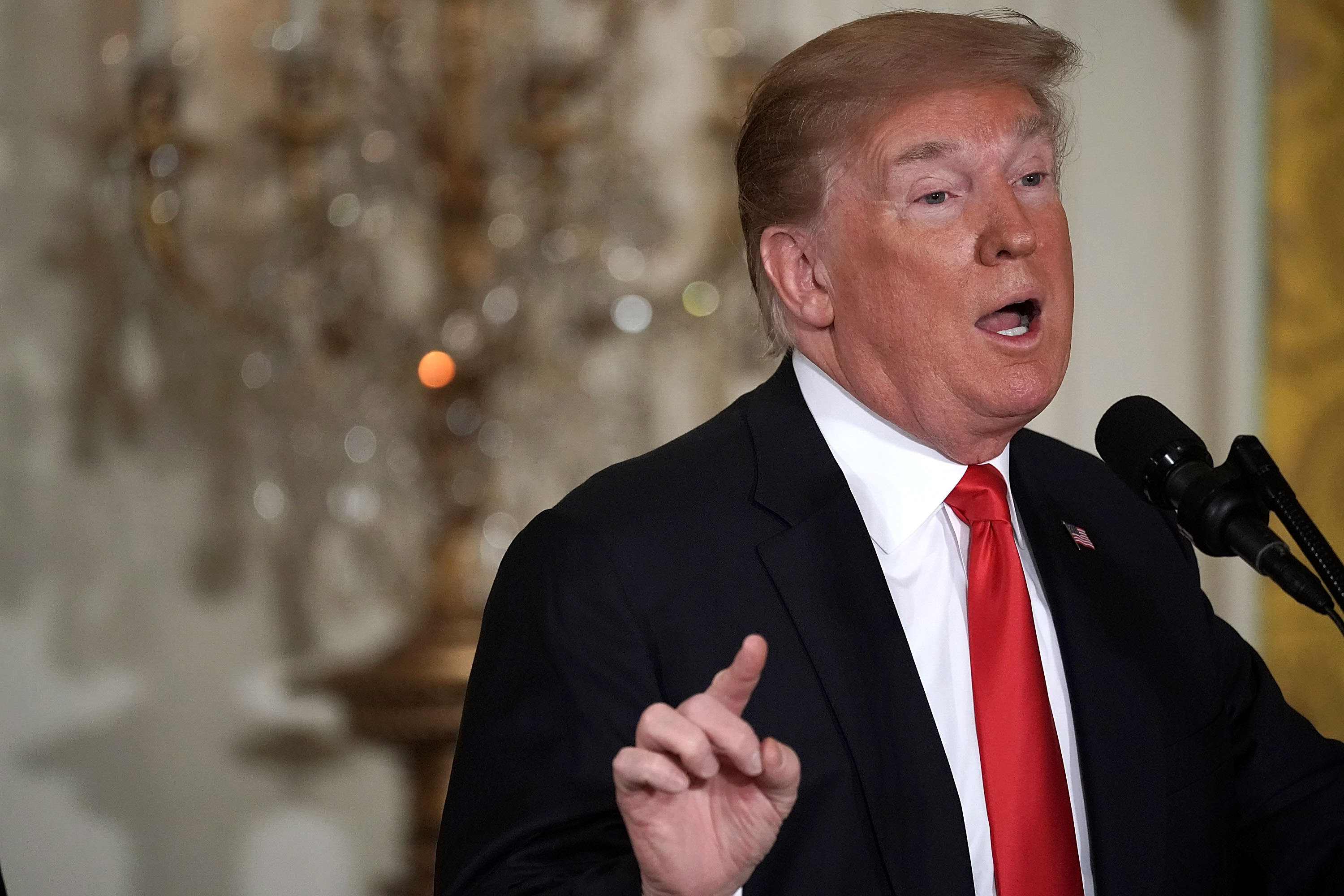10 things you need to know today: June 19, 2018
Trump defends separating undocumented immigrant families, Kim Jong Un visits China to brief leaders on Trump summit, and more


- 1. Trump defends separation of migrant families
- 2. Kim Jong Un makes third trip to China since March
- 3. DOJ watchdog tells senators bad decisions hurt FBI reputation
- 4. Trump threatens more tariffs against China
- 5. Trump orders creation of 'Space Force'
- 6. Supreme Court puts off decision on constitutionality of partisan gerrymandering
- 7. Senate backs reinstating ZTE penalties in rebuke of Trump
- 8. Judge rejects Kansas' proof-of-citizenship voter registration law
- 9. Trump blames immigration for non-existent crime surge in Germany
- 10. Rapper XXXTentacion shot and killed in Florida
1. Trump defends separation of migrant families
President Trump on Monday defended his administration's "zero tolerance" immigration policies against growing outrage over the separation of migrant children from their parents. Trump said tough action against illegal immigration was critical for U.S. security and sovereignty, declaring that he would not let the country "be a migrant camp" on his watch. Trump also said the policy was "the Democrats' fault" for lenient policies that made the U.S. a magnet for migrant families. Nearly 2,000 children have been separated from their parents under the policy in the last six weeks. Evangelical leaders and four former first ladies have joined lawmakers from both parties in condemnation, with many of the critics calling images of children in fenced pens a national disgrace.
2. Kim Jong Un makes third trip to China since March
North Korean leader Kim Jong Un arrived in China on Tuesday for a two-day visit, his third trip since March. Kim is expected to brief Chinese President Xi Jinping on his recent summit with President Trump. Kim and Trump agreed to work together toward the denuclearization of the Korean Peninsula. Trump also offered to guarantee the security of the North Korean regime and promised to end "war games" with South Korea, which both North Korea and China have criticized as provocative. The long-reclusive Kim also is expected to use the clout he gained from his meeting with Trump to push for relief from tough international economic sanctions.
The Week
Escape your echo chamber. Get the facts behind the news, plus analysis from multiple perspectives.

Sign up for The Week's Free Newsletters
From our morning news briefing to a weekly Good News Newsletter, get the best of The Week delivered directly to your inbox.
From our morning news briefing to a weekly Good News Newsletter, get the best of The Week delivered directly to your inbox.
3. DOJ watchdog tells senators bad decisions hurt FBI reputation
Justice Department Inspector General Michael Horowitz told the Senate Judiciary Committee on Monday that despite his scathing review of the FBI's handling of the Hillary Clinton email investigation, there was no "documentary evidence" that agents were influenced by political bias. Horowitz said, however, that bad decisions by Justice Department and FBI leaders seriously damaged the reputations of both institutions, as did negative references to President Trump in text messages between senior FBI counterintelligence agent Peter Strzok and bureau attorney Lisa Page. FBI Director Christopher Wray said the FBI was following up on misconduct allegations against people mentioned in the report, but that, "Nothing in the report impugned the reputation of the FBI as a whole."
4. Trump threatens more tariffs against China
President Trump on Monday threatened to impose tariffs on another $200 billion worth of Chinese goods unless Beijing gives in to his demands, which he says will make trade between the two countries more fair. Trump last week finalized tariffs on $50 billion worth of Chinese imports in retaliation for levies China slapped on U.S. goods after Trump's first round of levies. Trump threatened to go even further if China takes another shot in an escalating trade war. "This latest action by China clearly indicates its determination to keep the United States at a permanent and unfair disadvantage," Trump said Monday. China said Trump's threat violated "market laws" and the terms of previous negotiations. U.S. stock futures plunged ahead of Tuesday's open on the rising tensions.
A free daily email with the biggest news stories of the day – and the best features from TheWeek.com
5. Trump orders creation of 'Space Force'
President Trump said Monday that he would have the Defense Department create a new "Space Force" as an independent sixth branch of the armed forces. Trump mentioned the idea in March, at first saying it was a joke, but now says he wants a force that is "separate but equal" to the Air Force, which has already conducted secret tests of an unmanned space plane, the X-37B. "It is not enough to have an American presence in space, we must have American dominance in space," Trump said, adding that he didn't want the U.S. to fall behind "China and other countries." The U.S., China, and Russia all have signed the 1967 Outer Space Treaty, which prohibits testing weapons and establishing military bases in space.
6. Supreme Court puts off decision on constitutionality of partisan gerrymandering
The Supreme Court on Monday declined to rule on two key challenges to partisan gerrymandering, delaying a final decision on whether it is unconstitutional for state legislatures to design voting districts to give one party more political power. The court unanimously said the plaintiffs in a challenge to a Republican redistricting plan in Wisconsin had not shown that they suffered direct injury, necessary to give them standing to sue. The justices sent that case back to a trial court. The Supreme Court also unanimously found that Republican challengers to a Democratic redrawing of a Maryland congressional district in 2011 had waited too long to try to block it. The moves left the door open to future challenges against gerrymandering.
7. Senate backs reinstating ZTE penalties in rebuke of Trump
The Senate on Monday passed a bill seeking to reimpose a ban on Chinese telecommunications giant ZTE. The defense spending bill was passed by a vote of 85-10, and must still be reconciled with the House version. A provision of the measure would prohibit the U.S. government from buying or subsidizing equipment from ZTE and another Chinese telecom company, Huawei, among other penalties. U.S. lawmakers consider ZTE a national security threat, and are concerned that its equipment could be used to spy on the U.S. and carry out cyberattacks. In April, the Commerce Department enacted a seven-year ban on American companies doing business with ZTE, but President Trump in May tweeted that he was working to keep ZTE afloat because "too many jobs in China" were being lost. ZTE shares dropped by nearly 24 percent on the news.
8. Judge rejects Kansas' proof-of-citizenship voter registration law
U.S. District Judge Julie Robinson on Monday struck down Kansas' proof-of-citizenship voter registration law in a ruling that included blistering criticism of Kansas Secretary of State Kris Kobach. Before she blocked it with a preliminary injunction, Robinson wrote that the state's effort to make voters show proof of citizenship during registration prevented "tens of thousands of eligible citizens" from registering to vote and violated the Constitution and the National Voter Registration Act. She ordered Kobach to take six extra hours of continuing legal education that "pertain to federal or Kansas civil rules of procedure or evidence." Kobach, who is running for governor, says large numbers of noncitizens have voted in U.S. elections, although there is no evidence of widespread fraud.
9. Trump blames immigration for non-existent crime surge in Germany
President Trump criticized Germany for allowing a surge of migration, tweeting that the country's crime rate was "way up" because of the influx of people "who have so strongly and violently changed their culture!" Trump's underlying claim of sky-high crime, however, was wrong. Official crime statistics released last month showed that crime dropped by nearly 10 percent in Germany last year to its lowest level in a quarter century, with 5.8 million total criminal cases in 2017 compared to 6.4 million in 2016. "Germany is more secure," said Horst Seehofer, the country's top security official, although "there's still a lot to do." Trump was correct, however, in noting that publicity about crimes involving immigrants has eroded support for Chancellor Angela Merkel's government.
10. Rapper XXXTentacion shot and killed in Florida
Rapper XXXTentacion, whose real name was Jahseh Onfroy, was shot and killed outside a motorcycle dealership in Deerfield Beach, Florida, on Monday. He was 20. Onfroy surged in popularity over the last year and a half, with the breakout hit "Look at Me!" and a No. 1 album. He also faced allegations of violence against his pregnant girlfriend. On Monday, he reportedly was approached by two armed suspects in an apparent robbery attempt, and at least one of them fired on him before the assailants fled in a dark SUV. Videos taken at the scene showed him slumped in the driver's seat of a black BMW sports car as a bystander tried to take his pulse.
Harold Maass is a contributing editor at The Week. He has been writing for The Week since the 2001 debut of the U.S. print edition and served as editor of TheWeek.com when it launched in 2008. Harold started his career as a newspaper reporter in South Florida and Haiti. He has previously worked for a variety of news outlets, including The Miami Herald, ABC News and Fox News, and for several years wrote a daily roundup of financial news for The Week and Yahoo Finance.
-
 7 bars with comforting cocktails and great hospitality
7 bars with comforting cocktails and great hospitalitythe week recommends Winter is a fine time for going out and drinking up
-
 7 recipes that meet you wherever you are during winter
7 recipes that meet you wherever you are during winterthe week recommends Low-key January and decadent holiday eating are all accounted for
-
 Nine best TV shows of the year
Nine best TV shows of the yearThe Week Recommends From Adolescence to Amandaland
-
 10 things you need to know today: January 24, 2024
10 things you need to know today: January 24, 2024Daily Briefing Trump closes in on nomination with New Hampshire win over Haley, 'Oppenheimer' leads the 2024 Oscar nominations, and more
-
 10 things you need to know today: January 23, 2024
10 things you need to know today: January 23, 2024Daily Briefing Haley makes last stand in New Hampshire as Trump extends polling lead, justices side with US over Texas in border fight, and more
-
 10 things you need to know today: January 22, 2024
10 things you need to know today: January 22, 2024Daily Briefing DeSantis ends his presidential campaign and endorses Trump, the US and Arab allies push plan to end Gaza war, and more
-
 10 things you need to know today: January 21, 2024
10 things you need to know today: January 21, 2024Daily Briefing Palestinian death toll reportedly passes 25,000, top Biden adviser to travel to Egypt and Qatar for hostage talks, and more
-
 10 things you need to know today: January 20, 2024
10 things you need to know today: January 20, 2024Daily Briefing Grand jury reportedly convened to investigate Uvalde shooting response, families protest outside Netanyahu's house as pressure mounts for hostage deal, and more
-
 10 things you need to know today: January 19, 2024
10 things you need to know today: January 19, 2024Daily Briefing Congress averts a government shutdown, DOJ report cites failures in police response to Texas school shooting, and more
-
 10 things you need to know today: January 18, 2024
10 things you need to know today: January 18, 2024Daily Briefing Judge threatens to remove Trump from his defamation trial, medicine for hostages and Palestinians reach Gaza, and more
-
 10 things you need to know today: January 17, 2024
10 things you need to know today: January 17, 2024Daily Briefing The US strikes Houthi targets in Yemen a third time, Trump's second sex defamation trial begins, and more
